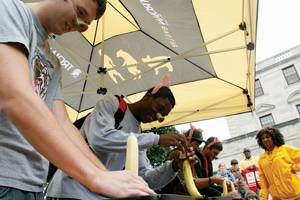Iowa State drops in Trojan study

Caleb Carroll, a freshman in Management Information Systems, takes first place in the ‘Trojan evolve’ condom race at Iowa State University outside the Memorial Union, Sept. 10, 2008. He beat his friends, Andrew Lopez, freshman in International Studies, Phill Anton, freshman in Plant Biology, and Trez Norwood, freshman in Bio Chemistry, with a time of 34 seconds. The Trojan tour, which has traveled to 60 different locations around the country, has made it their goal to educate students about safer sex practices. Photo: Chris Conetzkey/Iowa State Daily
October 6, 2008
Last week Trojan brand condoms released its 2008 Trojan Sexual Health Report Card, and according to the results Iowa State doesn’t make the grade. The survey of 139 colleges and universities throughout the country ranks Iowa State at 96.
The study was conducted from March through June by Sperling’s BestPlaces, an independent, private research organization, and based the rankings on 13 components.
Bert Sperling, president of Sperling’s BestPlaces, said the survey was designed to rank the availability of information and resources. He stressed the survey was not intended to evaluate prevalence of sexually transmitted diseases, HIV or the use of contraceptives.
Although Trojan publicizes its survey as a “Sexual Health Report Card,” Sperling said the study wasn’t intended to evaluate sexual health.
“We are not measuring sexual health,” Sperling said. “We were not looking at, for instance, use of contraceptives on campus…. We wanted to see what colleges were doing the best job at making information available to students.”
Many of the 13-point criteria used by Sperling’s focused on educational materials and resources available from each university’s student health center. Sperling said many factors impacted the rankings, including outreach to students, quality of educational materials, Web site information and the types of services provided.
In addition to professional evaluation, a new online student opinion poll was added into the ranking criteria.
A press release from Trojan stated, “Student opinion findings were a major factor in determining this year’s rankings… Similar to college grading, each school was assigned a GPA to determine their ranking, where an ‘A’ equals 4.0, a ‘B,’ 3.0, a ‘C,’ 2.0 and so on.”
Iowa State received a 2.49 GPA.
The survey was publicized on Facebook as an attempt, Sperling said, to reach the maximum number of students in the most cost efficient manner. In total, around 9,000 students responded, which averages out to approximately 65 students per university.
Jeffrey Ryan Whitt, freshman in pre-business, said he does not think sexual health programs are conducted in the right way.
“I also feel like a lot of times the way they publicize their programs is done in a way that is meant to be funny, when in all reality, it shouldn’t be.”
Ray Rodriguez, health promotion coordinator with the Student Health Center, believes the study may negatively influence students’ views of sexual health at Iowa State.
“I think people see it and think that the health care can’t be that good,” Rodriguez said.
The study, he said, doesn’t accurately represent the sexual health programs and resources on campus. Currently, the Student Health Center offers full sexually transmitted disease tests, free condom Wednesdays and an upstart peer education program, called Student 2 Student, in which students teach their peers about sexual health related issues.
Rodriguez said the greatest challenge is the way students view sexually transmitted diseases at Iowa State.
“The biggest weakness is that we have a culture that believes it can’t happen to me,” he said. “I think the study has more to do with perception than reality. We do a very good job.” Noelle Lichty, junior in pre-business, said she thinks students should take responsibility for their own sexual health.
“I assume that there are opportunities out there if I ever needed them, but with my personal experience at Iowa State I have never have,” Lichty said. “If you’re having sex, I think you should know where to go and what to do.”
Criteria for Trojan’s Sexual Health Report Card:
1. Student opinion of health center
2. Hours of Operation
3. Allow drop-ins, require appointments
4. Separate sexual awareness program
5. Contraceptives, free or at cost
6. Condoms, free or at cost
7. HIV testing (on/off campus, at cost)
8. STD testing (on/off campus, at cost)
9. Anonymous advice via email / column
10. Lecture / outreach programs
11. Student peer groups
12. Sexual assault programs
13. Website usability, functionality
Related Links
The Trojan Sexual Health Report Card, in its entirety






